| Order | Treasurer | Portrait | Party | Prime Minister | Term start | Term end | Term in office |
|---|
| 1 | Sir George Turner |  | | Protectionist | Barton | 1 January 1901 (1901-01-01) | 27 April 1904 (1904-04-27) | 3 years, 117 days |
| Deakin |
| 2 | Chris Watson 1 |  | | Labour | Watson | 27 April 1904 (1904-04-27) | 17 August 1904 (1904-08-17) | 112 days |
| (1) | Sir George Turner |  | | Protectionist | Reid | 17 August 1904 (1904-08-17) | 4 July 1905 (1905-07-04) | 321 days |
| 3 | Sir John Forrest |  | Deakin | 4 July 1905 (1905-07-04) | 30 July 1907 (1907-07-30) | 2 years, 26 days |
| 4 | Sir William Lyne |  | 30 July 1907 (1907-07-30) | 13 November 1908 (1908-11-13) | 1 year, 106 days |
| 5 | Andrew Fisher 1 |  | | Labour | Fisher | 13 November 1908 (1908-11-13) | 2 June 1909 (1909-06-02) | 201 days |
| (3) | Sir John Forrest |  | | Commonwealth Liberal | Deakin | 2 June 1909 (1909-06-02) | 29 April 1910 (1910-04-29) | 331 days |
| (5) | Andrew Fisher 1 |  | | Labour | Fisher | 29 April 1910 (1910-04-29) | 24 June 1913 (1913-06-24) | 3 years, 56 days |
| (3) | Sir John Forrest |  | | Commonwealth Liberal | Cook | 24 June 1913 (1913-06-24) | 17 September 1914 (1914-09-17) | 1 year, 85 days |
| (5) | Andrew Fisher 1 |  | | Labor | Fisher | 17 September 1914 (1914-09-17) | 27 October 1915 (1915-10-27) | 1 year, 40 days |
| 6 | William Higgs |  | Hughes | 27 October 1915 (1915-10-27) | 14 November 1916 (1916-11-14) | 1 year, 18 days |
| 7 | Alexander Poynton |  | | National Labor | 14 November 1916 (1916-11-14) | 17 February 1917 (1917-02-17) | 95 days |
| (3) | Sir John Forrest |  | | Nationalist | 17 February 1917 (1917-02-17) | 27 March 1918 (1918-03-27) | 1 year, 38 days |
| 8 | William Watt |  | 27 March 1918 (1918-03-27) | 28 July 1920 (1920-07-28) | 2 years, 123 days |
| 9 | Sir Joseph Cook |  | 28 July 1920 (1920-07-28) | 21 December 1921 (1921-12-21) | 1 year, 146 days |
| 10 | Stanley Bruce |  | 21 December 1921 (1921-12-21) | 9 February 1923 (1923-02-09) | 1 year, 50 days |
| 11 | Earle Page | 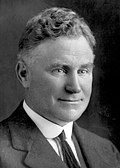 | | Country | Bruce | 9 February 1923 (1923-02-09) | 22 October 1929 (1929-10-22) | 6 years, 255 days |
| 12 | Ted Theodore |  | | Labor | Scullin | 22 October 1929 (1929-10-22) | 9 July 1930 (1930-07-09) | 260 days |
| 13 | James Scullin 1 |  | 9 July 1930 (1930-07-09) | 29 January 1931 (1931-01-29) | 204 days |
| (12) | Ted Theodore |  | 29 January 1931 (1931-01-29) | 6 January 1932 (1932-01-06) | 342 days |
| 14 | Joseph Lyons 1 |  | | United Australia | Lyons | 6 January 1932 (1932-01-06) | 3 October 1935 (1935-10-03) | 3 years, 270 days |
| 15 | Richard Casey |  | 3 October 1935 (1935-10-03) | 8 April 1939 (1939-04-08) | 3 years, 187 days |
| Page | 7 April 1939 (1939-04-07) | 26 April 1939 (1939-04-26) |
| 16 | Robert Menzies 1 |  | Menzies | 26 April 1939 (1939-04-26) | 14 March 1940 (1940-03-14) | 323 days |
| 17 | Percy Spender |  | 14 March 1940 (1940-03-14) | 28 October 1940 (1940-10-28) | 228 days |
| 18 | Arthur Fadden 1 | 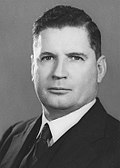 | | Country | 28 October 1940 (1940-10-28) | 30 August 1941 (1941-08-30) | 344 days |
| Fadden | 29 August 1941 (1941-08-29) | 7 October 1941 (1941-10-07) |
| 19 | Ben Chifley 1 |  | | Labor | Curtin | 7 October 1941 (1941-10-07) | 6 July 1945 (1945-07-06) | 8 years, 73 days |
| Forde | 6 July 1945 (1945-07-06) | 13 July 1945 (1945-07-13) |
| Chifley | 13 July 1945 (1945-07-13) | 19 December 1949 (1949-12-19) |
| (18) | Sir Arthur Fadden |  | | Country | Menzies | 19 December 1949 (1949-12-19) | 10 December 1958 (1958-12-10) | 8 years, 356 days |
| 20 | Harold Holt |  | | Liberal | 10 December 1958 (1958-12-10) | 26 January 1966 (1966-01-26) | 7 years, 47 days |
| 21 | William McMahon | 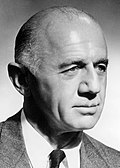 | Holt | 26 January 1966 (1966-01-26) | 18 December 1967 (1967-12-18) | 3 years, 290 days |
|---|
| McEwen | 19 December 1967 (1967-12-19) | 10 January 1968 (1968-01-10) |
| Gorton | 10 January 1968 (1968-01-10) | 12 November 1969 (1969-11-12) |
| 22 | Les Bury |  | | 12 November 1969 (1969-11-12) | 10 March 1971 (1971-03-10) | 1 year, 130 days |
| McMahon | 10 March 1971 (1971-03-10) | 22 March 1971 (1971-03-22) |
| 23 | Billy Snedden |  | 22 March 1971 (1971-03-22) | 5 December 1972 (1972-12-05) | 1 year, 258 days |
| 24 | Gough Whitlam 1 | 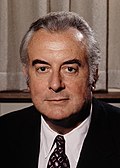 | | Labor | Whitlam | 5 December 1972 (1972-12-05) | 19 December 1972 (1972-12-19) | 14 days |
| 25 | Frank Crean |  | 19 December 1972 (1972-12-19) | 11 December 1974 (1974-12-11) | 1 year, 357 days |
| 26 | Jim Cairns |  | 11 December 1974 (1974-12-11) | 6 June 1975 (1975-06-06) | 177 days |
| 27 | Bill Hayden |  | 6 June 1975 (1975-06-06) | 11 November 1975 (1975-11-11) | 158 days |
| 28 | Phillip Lynch |  | | Liberal | Fraser | 11 November 1975 (1975-11-11) | 19 November 1977 (1977-11-19) | 2 years, 8 days |
| 29 | John Howard |  | 19 November 1977 (1977-11-19) | 11 March 1983 (1983-03-11) | 5 years, 112 days |
| 30 | Paul Keating |  | | Labor | Hawke | 11 March 1983 (1983-03-11) | 3 June 1991 (1991-06-03) | 8 years, 84 days |
| 31 | Bob Hawke 1 | 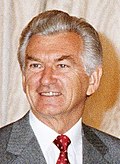 | 3 June 1991 (1991-06-03) | 4 June 1991 (1991-06-04) | 1 day |
| 32 | John Kerin |  | 4 June 1991 (1991-06-04) | 9 December 1991 (1991-12-09) | 189 days |
| 33 | Ralph Willis |  | 9 December 1991 (1991-12-09) | 20 December 1991 (1991-12-20) | 18 days |
| Keating | 20 December 1991 (1991-12-20) | 27 December 1991 (1991-12-27) |
| 34 | John Dawkins | 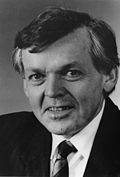 | 27 December 1991 (1991-12-27) | 23 December 1993 (1993-12-23) | 1 year, 361 days |
| (33) | Ralph Willis |  | 23 December 1993 (1993-12-23) | 11 March 1996 (1996-03-11) | 2 years, 79 days |
| 35 | Peter Costello | 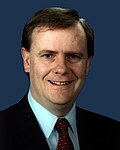 | | Liberal | Howard | 11 March 1996 (1996-03-11) | 3 December 2007 (2007-12-03) | 11 years, 267 days |
| 36 | Wayne Swan |  | | Labor | Rudd | 3 December 2007 (2007-12-03) | 24 June 2010 (2010-06-24) | 5 years, 206 days |
| Gillard | 24 June 2010 (2010-06-24) | 27 June 2013 (2013-06-27) |
| 37 | Chris Bowen |  | Rudd | 27 June 2013 (2013-06-27) | 18 September 2013 (2013-09-18) | 83 days |
| 38 | Joe Hockey | 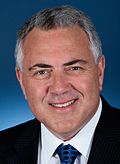 | | Liberal | Abbott | 18 September 2013 (2013-09-18) | 15 September 2015 | 2 years, 3 days |
| Turnbull | 15 September 2015 (2015-09-15) | 21 September 2015 |
| 39 | Scott Morrison | 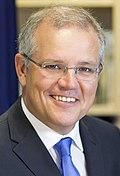 | 21 September 2015 (2015-09-21) | 24 August 2018 (2018-08-24) | 2 years, 337 days |
| 40 | Josh Frydenberg 2 |  | Morrison | 24 August 2018 (2018-08-24) | 23 May 2022 (2022-05-23) | 3 years, 272 days |
| (39) | Scott Morrison 1 2 |  | 6 May 2021 (2021-05-06) | 1 year, 17 days |
| 41 | Jim Chalmers |  | | Labor | Albanese | 23 May 2022 (2022-05-23) | Incumbent | 3 years, 201 days |
















































